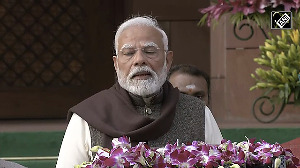'For the first time railway passenger figures have fallen by 150 million.'
Who is taking over the railways? It is the airlines and Volvo buses.'
'I think governments -- whether this one or the ones earlier -- have not understood the strength of the Indian Railways... that it can easily add 2.5 per cent to GDP.'

The Narendra Modi government on September 21 decided to do away with having a Railway Budget and merged it with the Union Budget.
The government's reasoning for ending the 92-year-old practice was that the move will come as a relief to the railways, which, until now, has been reeling under an additional burden of Rs 40,000 crore (Rs 400 billion) from higher salaries, following implementation of the 7th Pay Commission.
With the Budget presentation out of the way, the railways will get rid of the annual dividend of Rs 10,000 crore (Rs 100 billion) it has to pay for gross budgetary support from the government.
But will the decision result in a lack of accountability in the already loss-making Indian Railways? Will it dimnish the railway minister's authority?
To seek answers to these pertinent questions, Rediff.com's Syed Firdaus Ashraf reached out to former railway minister Dinesh Trivedi.
Trivedi, who had to resign as railway minister in the United Progressive Alliance government following the outcry over his proposal to hike railway fares, says even though the Indian Railways is one of the best in the world in terms of efficiency, it is in dire need of investment.
Are you unhappy with the proposal to merge the Railway Budget and Union budget?
Who says I am not happy? I am not against it.
It does not matter whether there is one Budget or not. What does matters is the kind of investment you have for the railways.
It is time we have a national policy for the railways on the lines of defence and foreign policies. It should not change with a change of minister or Railway Board chairman or the government.
What matters is what investment plan you have for the railways.
Can you throw some light on the history of the Railway Budget?
The separation convention came into being in 1924 (the year the first Railway Budget was presented). The railways made a profit of Rs 103 crore in that period. That is why the British thought of having a separate Budget and that is where you can charge dividend.
The railways must pay dividend, which is higher than the interest rate. This is a legacy of the British era.
At the moment, even if the railways wants to have a separate Budget they cannot have it because they have no money.
A Budget can only be made if you have money. The situation of paying a dividend is also very stupid. Do you charge a dividend from defence? Do you charge a dividend from surface transport? From education or health? You don't! So why charge a dividend from the railways?
There is an obligation for the government to put in money and invest in the railways like you do for roadways. That leads to another question -- if you do not have a separate Budget, why do you need a separate minister for the railways?
The surface transport ministry, railway, aviation and shipping all must be clubbed into one ministry of transportation.
How did the British make money through the railways? Rs 103 crore in those times.
It made money because 90 per cent of traffic moved by rail. 100 per cent of goods used to travel by trains.
Roads were not developed then. Now only 30 per cent of traffic moves by train and the monopoly of the railways has been broken as far as moving of goods is concerned.
A day will come when you will not require the Indian Railways.
What could have been the government's thinking behind clubbing the Railway Budget with the Union Budget? Is it because of the Bibek Debroy Committee's recommendations?
I have no idea. This is not going to make any difference as far as the working of the railways is concerned.
Today, there are three important things in India -- the Ganga, the Himalyas and the Indian Railways. These are the things that unite India.
If you have defined the railways as a commercial organisation, so let me ask you -- a guy sitting in Bastar, a Naxal-affected area, are you not going to connect with him to India?
India cannot be connected with the people who can only afford to connect with India. Bharat and India has to be connected together.
I think the governments -- whether this one or the ones earlier -- have not understood the strength of the Indian Railways... that it can easily add 2.5 per cent to the GDP.
Without the railways, you cannot have growth or GDP. You cannot cut down food inflation.
On one side, food is rotting and on the other people in far flung area of Odisha are going without food, there is malnutrition.
No railway in the world makes profit by itself, but indirectly it adds to the GDP.
The railways, at the moment, is in a financial mess.
Why did the financial commissioner resign and go? He said he was taking voluntary retirement, but why did he go? There is something which is not right and I think the people of this country must know about it.
The separation of the railways (Budget) was through a piece of legislation in the national assembly under the British. There are so many British laws that are still being carried on. So rightly, they should have brought this to Parliament and repealed it.
But the proposal to scrap the Railway Budget had been going on for long...
Yes, but has there been any serious debate on this issue? The proposal was going on because the railways could not pay the dividend and why should it pay?
The merger talk was going on because you cannot pay the dividend and because the railways was becoming more politicised.
Now, there won't be any serious debate on the railways. The railway ministry's responsibility has now shifted to the finance ministry.
Who will fulfill the fiscal deficit?
If everything has gone to the finance ministry, the railway ministry can relax and say, 'We have no responsibility whether we make money or not, let the finance minister bother about it.'
Other ministries do not have balance sheets. Nobody bothers what is happening in the health ministry or other ministries. That's because they were investing in infrastructure.
Now no one would know what is happening in the railways because no one will have the figures.
Will this move dilute the railway minister's role?
The railway minister's role has already been diluted.
Earlier, people used to talk about the railways, but now nobody does... you know why? Because, for the first time railway passenger figures have fallen by 150 million and freight too has come down.
Who is taking over the railways? It is the airlines and Volvo buses.
A man sitting far away says, 'I will pay more and go by Volvo bus rather than the railways.'
For the first time, the number of passengers has come down.
Freight has come down like crazy.
Ultimately, I think the government would want to privatise the railways.
Do these figures show that Indians do not prefer to travel by rail and more people prefer to go by air or Volvo buses?
For you and me, Rs 10 will not matter much, but a guy at the extreme end of society... what is his choice where buses are not there, roads are not there? Does he have any choice?
The railways are supposed to unite people and by doing this you are creating more and more backward areas.
We are living in a market economy that is driven by business and profit. Therefore, the government is living in a realistic world unlike the past.
So you tell those who are poor to go to hell?
Those who cannot afford school can go to hell?
Do we tell those who cannot afford any kind of social benefits that we do not need you?
Is India only going to be for the 10 per cent of rich people?
You are talking of health. Let me tell you that five star hospitals are coming up; you and me will not be able to afford it.
Even a middle class family is ruined by hospital bills. If you cannot pay, then it is your problem, go to hell.
So what will you do? You will pick up a gun.
We are in a mess and there should have been a bigger debate on the railways.
But the railways are very cheap to travel compared to other modes of transport. Therefore, it is difficult to run a railway business, isn't it? How will they make money?
That is a different story. I increased the fare by a few paisa and I lost my job.
Which chamber came to support me? Did anybody come to say why this happened to me?
We in India have double standards. I will stick to the railways and I feel it is the best organisation in the world -- it's very efficient and people are committed -- but it needs investment.
Why do you think Indians are shifting to other modes of transport?
They are shifting because of reliability.
Will privatisation be good or bad for the railways?
People of India have not understood the strength of the Indian Railways.
I just visited China. One of the reasons the Chinese economy is great is because they paid a lot of attention to infrastructure, especially railways.
They were 15 years behind in railways compared to us, 25 years ago. Today, they have gone so far that you can never catch them.
I just went on their high speed train which goes at 350 km an hour. There is no jerk, nothing. You feel you are sitting in an aircraft and makes lesser noise than one.
Even their high speed trains are subsidised.
From Beijing to Shanghai it took us five hours. (The Beijing to Shanghai flight time is 2 hours, 10 minutes.)
Photograph: Anindito Mukherjee/Reuters











 © 2025
© 2025